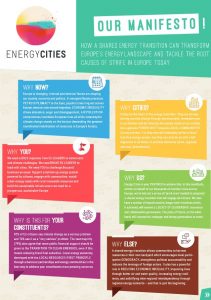New european landscape: “From progressive minority to critical mass”
Policy brief by Claire Roumet
Just after the European elections, this title could be confusing. Indeed, it does not refer to the new European Parliament, but to the legacy of the last five years. There are so many articles on the impossible new balance between the antagonistic political forces, and what will emerge is so difficult to predict that I prefer to go back to what has been achieved.
And from a “local energy transition” perspective, the least we can say is that the EU’s new legal, political and financial landscape is in place. It is now possible to move from the most advanced pioneers and cities to the “progressive minority”. And it is in the next decade that we will have to move from the progressive minority to the critical mass.
Between 2014 and 2019, the European Commission proposed, and the European Parliament and the Council adopted, new rules that are absolutely necessary for the deployment of the energy transition, opening up energy markets to local actors and opening the way for decentralised production, storage and distribution. It has also updated the transport directives that encourage the development of electric and “soft” mobility, set out the requirements of long-term strategies for the renovation of buildings and strengthened the EU’s energy efficiency objectives.
Equally important is the fact that the governance of the Energy Union provides a model for the development of a new policy across the EU. The legislation recognises the synergies and links between climate and energy planning, and provides a unique tool for building consensus and strategic vision by all stakeholders. The Covenant of Mayors is a key initiative on which the dialogue can be based.
It is important to take stock and thank all the EU leaders who have fought hard to make this energy revolution happen. In the future, municipalities should finally be able to play their role in the local transition.
It is also interesting to do a “verification versus execution” exercise with the agenda we proposed five years ago and to see that almost all our requests have been met.
So…. boarding complete.
The next destination is now very clear: to make these new EU rules a reality and use their full potential to revitalise local economies, all EU policies must allow local actors to benefit from the Energy Union Governance Regulation. Otherwise, like many other guidelines or good concepts, it will fail in its purpose and get lost in the transition. To avoid this, we have developed a clear roadmap for the new EU leaders.
And what is interesting about the new European Parliament is that any decision will require complex coalitions. There are enough political forces for Europe to offer a future for future generations.
There is a progressive minority to lead us to critical mass!


